If you know me at all, you know I will extol the life-sustaining importance of romance until I’m blue in the face. And every now and then, a piece of art comes along that grabs my heart and squeezes to remind me viscerally of this fact.
I’ve had the release of Bridget Jones: Mad About the Boy on my calendar for weeks, and I would have heartily enjoyed myself even had it been subpar.
But oh, I thought it was phenomenal. And a lot of people agree with me:
When I finished watching, all I could think was: this is so much of what I love about the genre.
And then I thought: I want to articulate exactly why.
While I’m glad so many people are appreciating this movie, I’m less interested in why everyone loves it and more interested in why I loved it. So here’s a little unannounced mid-month, Valentine-y exploration of what I think makes this movie work so well, why it hit me so hard, and why I think this genre can work absolute magic.
(FYI: Going to keep this as spoiler-free as I can because I know this film just released, but also if you’re going to be spoiled by discussions of a HEA we see coming from Act I, I am sorry but perhaps you should skip this one. I’ll mark the most spoiler-y bit so you can skip over it if you like!)
First and foremost: Bridget is one of the most iconic narrators in romance history.
I’ve loved Bridget Jones since I was a teenager reading the very first book—her voice just jumped off the page. It was so fresh and candid and yes, cringey (that girl invented second-hand embarrassment and I won’t hear a bad word about her; perhaps that’s another newsletter, tbh).
But gosh, isn’t what we love about her how deeply imperfect she is? Bridget constantly sets self-improvement goals and blasts through them almost immediately; she messes up, embarrasses herself, and lies to save face; she survives all the things we live in fear of (confessing private business in front of a full TV audience, being judged by the snobby acquaintances she feels inferior to, and yes, in this story, falling apart in the wake of a gigantic loss)—and we love her all the more for it.
As Mark Darcy famously says in the first installment, he loves her “just as she is.” This is not a novel point I’m making—it is exactly the secret sauce of this franchise—but it hit me anew while watching this time. Maybe because I was suffering my own self-criticism spiral, holding myself to expectations I would enforce on no one else (🤠), but it felt like such a warm hug to see Bridget making an absolute mess of things and still coming out okay.
Probably because I came of age during this renaissance of messy, bad-decision-making heroines, I have a soft spot for them still. I know many people who struggle with them—“Make better decisions!!” they will rightfully scream at screen or page— “Don’t slather that suspiciously smuggled experimental lip product all over your face in the wake of a breakup!”—but I find myself endlessly indulgent.
I think romance, at its best, enacts a sort of transitive property of love and acceptance: by seeing someone with our own flaws grow and find love, we can turn some of that same gentleness upon ourselves. That’s when a romance grounds the sugary delight of its tropes (and don’t get me wrong, I love a good trope) and sticks to our bones for a lot longer.
But let’s talk about tropes. Because this movie respects an audience of romance lovers.
Many have pointed out that this Bridget Jones movie is a bit more somber and contemplative, less of a rollicking laugh factory. But despite the themes of grief and loss—perhaps because of them—the movie more than delivers on the promise of its romance premise.
Some of my favorite romances are so effective because of the contrast between their emotional highs and lows. Nothing is more life-affirming and hopeful and romantic than someone finding their way through dark times, through baggage and trauma, with the help of connection and vulnerability and love. And after Mad About the Boy’s tear-jerking opening sequence (Colin Firth appearing in Bridget’s mind’s eye as she puts her children to bed! the goddamn OWL!!) viewers need those romantic peaks to pay off! It’s an especially tall order in this movie, where audiences are predisposed to loyalty to Mark Darcy and may be nursing some anger that he got killed off. 😭
So let’s break down some romance beats. (This section gets spoilery, I’m afraid, so feel free to skip to the photo of Chiwetel Ejiofor playing the piano if you are saving yourself.)
Okay, still here?
Then can we talk about the EXTENDED sequence where Roxster dives into a pool IN SLO-MO to SAVE A TINY PUPPY in front of A CROWD OF PEOPLE WHO DIDN’T THINK HE WAS REAL??? It had my hand over my mouth for a full minute. Reader, I was glued to the screen. Didn’t blink. And then shook my head and began a slow clap, alone in my living room.
The moment works on so many levels. First, of course, the wet shirt fan service to everyone missing Colin Firth in this movie, winking as it calls back to the famous Pride and Prejudice dive referenced in the first movie (the layers of this one give me a wonderful headache).
It’s also a moment that rewards Bridget for her vulnerability and her efforts to live and love again. You are CHEERING in your seat as she shows off her hot young boyfriend to the skeptical partygoers who think she made him up!!!
And it validates her choices—they may not be meant to be together forever, but he is a good, warm, loving person. He’s exactly who she needs as she begins to heal.
Now that is a midpoint of love. It is over-the-top, it is satisfying, it is swoony, and it is exactly the romantic high we came here for.
And, of course, it’s a false victory. Because Roxster isn’t the partner she needs moving forward, not quite the right match for where she is and what she needs in her life currently—for someone whose young daughter asks every man “are you my new daddy?”—but he’s the partner she needed to begin healing.
Which brings us to the slow burn of the real endgame. (This film walks a delicate and satisfying line. We know from the moment she meets the new science teacher, who’s blowing his whistle at dawdling students and telling off snobby parents, that he’s going to be perfect for Bridget in the end. But we still cheer for Roxster thanks to the role he plays in Bridget’s emotional healing. A tough act to pull off!)
When things start heating up with Mr. Walliker, it’s all the more satisfying for the time it took to build. Grieving, insecure, closed-off Bridget wasn’t ready for the real thing yet—they had to get to know and understand each other first. They had to face a few obstacles and differences, setting their relationship back in the most deliciously frustrating way.
But their relationship is the weightier counterpoint to Roxster’s charming fluff. Mr. Walliker may be teaching Bridget’s son that there’s no scientific evidence of any life after death and Bridget may initially be horrified, but their conversations ultimately help the whole family come to terms with their loss. Mr. Walliker isn’t heartless—he just has a different idea of what will help Billy heal. He’s one of the only people who sees the children for who they are (the moment where he rattles off specific compliments for Billy’s schoolwork and cricketing melted my heart) and sees how they’re struggling.
He reaches out to Bridget in a way no one else does. His stoic, pragmatic approach to life sits opposite Bridget’s romantic, optimistic chaos. They balance each other, learning from one other the way any satisfying romantic leads must.
It’s not really order that we science types fall in love with… it’s the beauty in things.
And thus Bridget finds her way to the real thematic messages about accepting loss and integrating it into your life. As Mr. Walliker says, “energy is only transferred, and that’s a scientific fact.” After which he proceeds to orchestrate the most pure-hearted grand gesture possible—one to help Billy reconnect with his memory of his father, and one which reminds Bridget that they’re “going to be okay.”
A perfectly calibrated moment: exactly what Bridget needs at this point in her arc, and something only he could give her. They’re endgame because they each have something the other needs; because they couldn’t learn the lessons they need about love and healing without each other’s help. Mark Darcy gave Bridget wisdom she needed long ago—that she’s wonderful exactly as she is—but she’s at a new stage of her life now, without him and with new questions. And she’s found someone who can help her through them.
What wins our hearts is the difference between generic romance and specific devotion—the difference between saving a puppy from a pool and a surprise performance during a school concert.
But the heart of this movie goes beyond even romantic love.
So, I started full-on sobbing (I’m fine) approximately ten minutes into the film, when Bridget is putting her two children to bed. They’re all still coping with the loss of Mark Darcy, and Bridget—while clearly nursing her own heartbreak, having just returned from a commemoration of Mark’s death, which she barely made it through in one piece—tucks her son into bed and tells him he can let his thoughts float away. That they don’t need him while he sleeps.
And when I realized I was getting teary along very predictable lines throughout the rest of the movie, I started connecting the dots.
When we see a flashback to Bridget’s father’s last days—Bridget sneaking unhealthy fried food into his hospital room, the two of them having a heart-to-heart and being told to smile into her mother’s camera as she carries on as if they aren’t in their final moments together. When he tells Bridget he wants her to live, not just survive—and when those words echo back and inspire her to pick herself up.
When we see her friends circling around her, all the ones who have supported her throughout decades at this point. Jude, Shazzer, Tom—all still ridiculously themselves, all still ridiculously in love with Bridget and supporting her in the best ways they know how.
When Bridget visits Daniel in the hospital, and he admits she’s his closest thing to next of kin, and they have a heart-to-heart about love lost and love that might be lingering more than one initially assumed.
When we see the deep connection between Bridget and her two very different children, who are the center of her universe. Mabel, who Daniel says is just as much of a terror as her mother; and Billy, who is much quieter, more introspective, and more able to grapple with the big questions about souls and afterlives that leave Bridget yearning to give him some comfort.
When we see Bridget herself showing up, stepping out, and being brave. Cracking open that diary again as the opening credits roll—the surest symbol of who she is, the habit she’s been neglecting for the four years since Mark’s death. Swapping out her infamous giant panties for something smaller and lacier.
The love celebrated in this story goes far beyond the romantic—it’s familial, and platonic, and self-embracing.
As with all my favorite romances, it centers the protagonist’s own journey. As resident genius Anna said on a recent Turning to Story episode (poorly paraphrased): “romance isn’t about getting someone else. It’s about growing into the person who will deserve that love.”
Just as in the first iconic Bridget Jones film, the Bridget at the end of Mad About the Boy is both entirely different than she was at the start and still exactly herself—perhaps simply more so, having embraced the spectrum of grief and love that will now help her feel whole in a way she hasn’t in a long time.
Oh, I love a good love story. Thank you for making it this far in my reflections, and if you watched and had thoughts of your own, please let me know!! If you haven’t watched, may I recommend this for one of the remaining cozy nights of this long weekend?
I truly wrote this newsletter to explore my own reactions, but I hope it gave you something worth the read, too. And it was fun enough for me that perhaps I will write more like it in future?
In the meantime, I’ll be here re-reading/re-watching the entire series and being grateful this wonderful genre exists.
Until next time, much love,
🤍 Emily






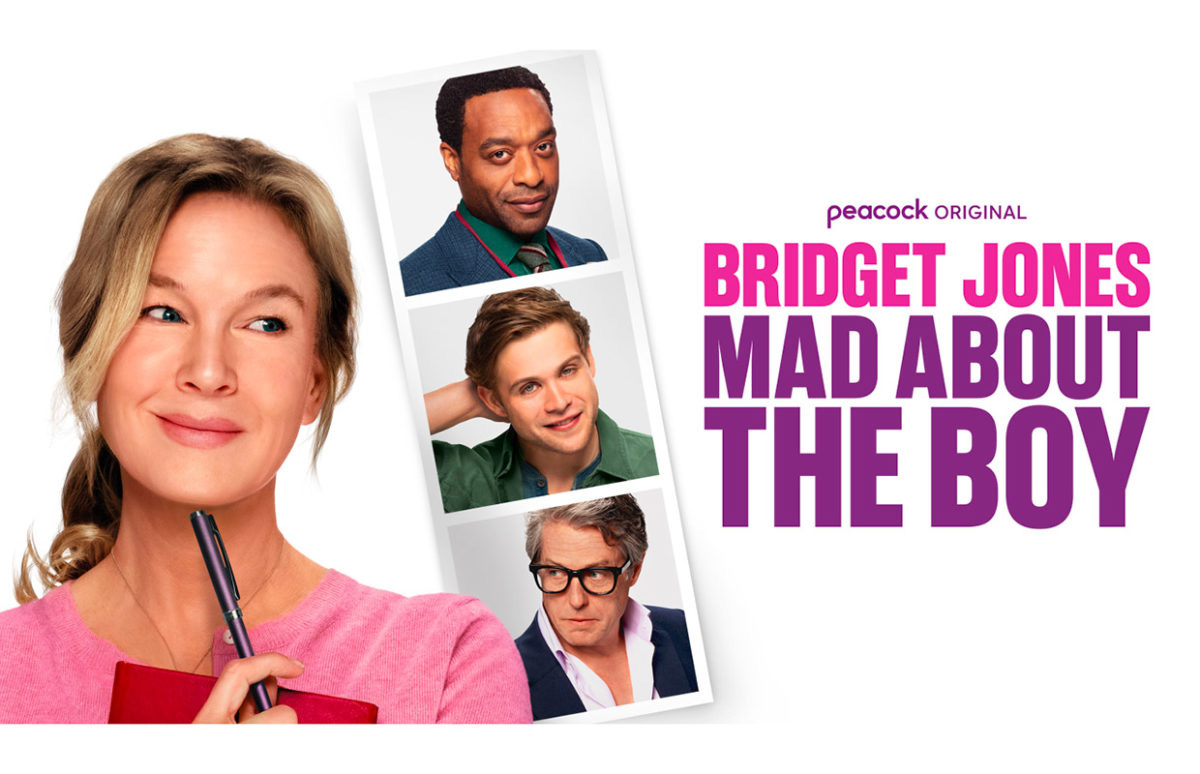

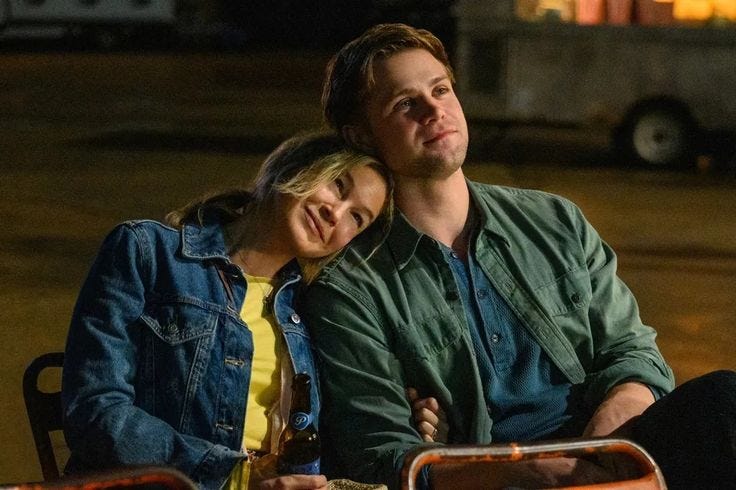
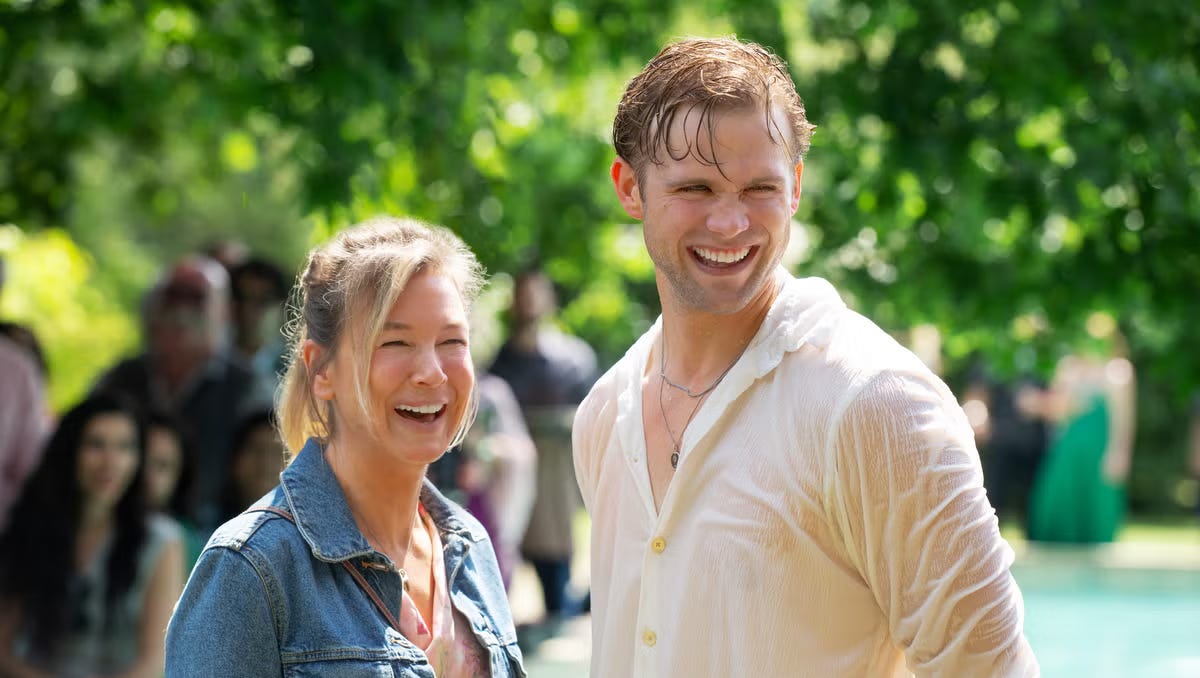

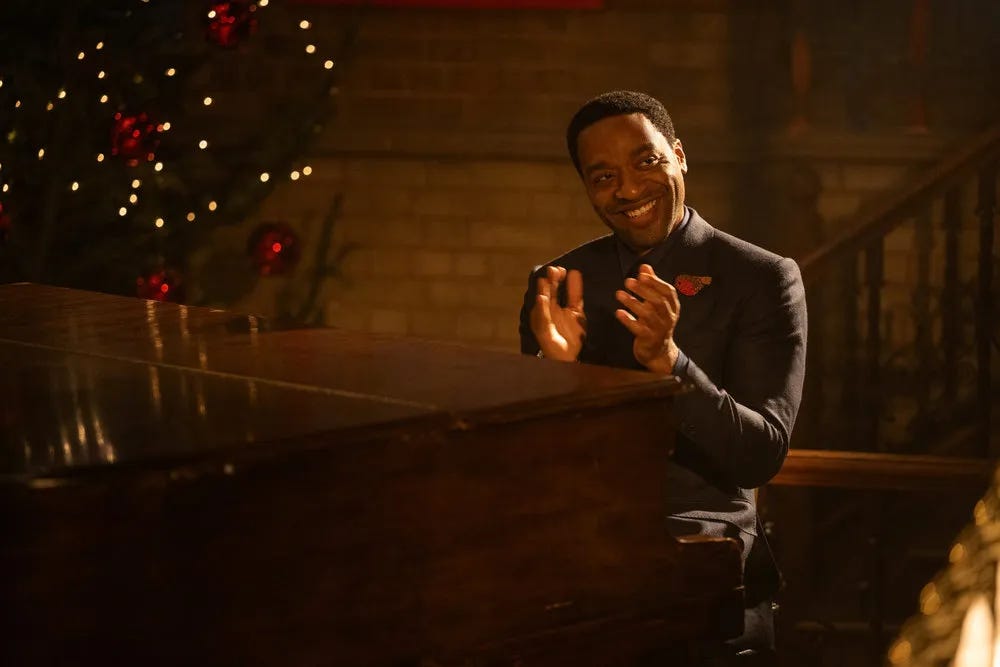

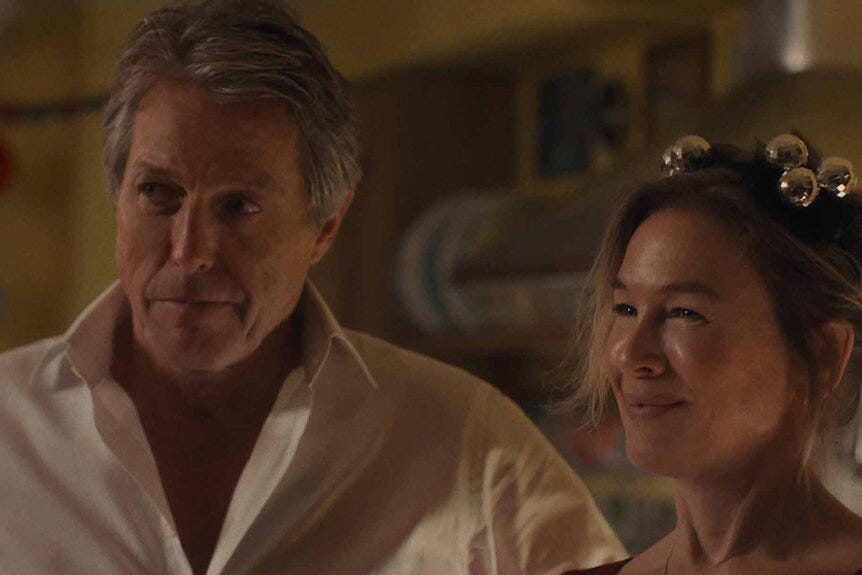

love this so much! 💜💜💜
I just saw this and it was sooo good! I loved your analysis.